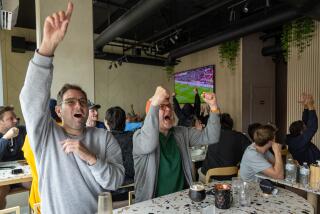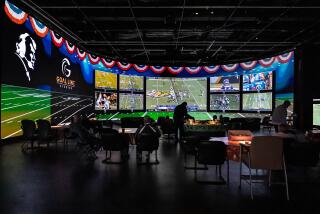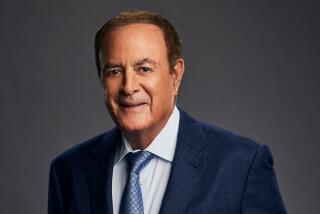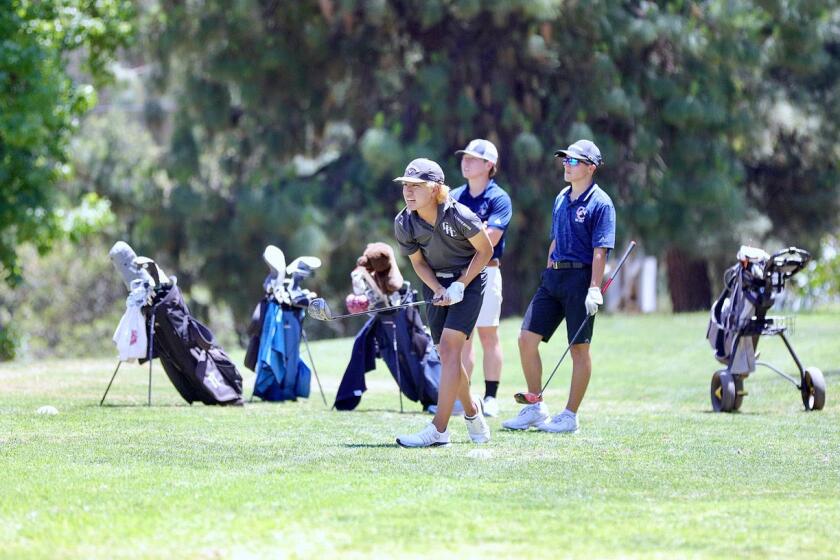A New Sight in Historic London--Chicago Bears on the Town
- Share via
LONDON — The British television reporter was shaggy-haired and slight. He was wearing a gray pin-striped suit, and he came up to Chicago Bear offensive tackle Keith Van Horne’s armpits.
“As you can see,” the reporter confidently told his camera as the rest of the Bears scrimmaged in the background, “American football players are rather large.”
He turned and stared up at Van Horne’s chin. Van Horne, his 6-foot-7 frame looming even larger in full football padding, leaned over and lifted the reporter up by his elbows.
The reporter cleared his throat and stared Van Horne boldly in the eye. “You must eat a lot,” he said.
Many Americans have stayed away from London this year, fearful of terrorism and a weak dollar. In the process, they have shattered the British image of a boistrous former colony populated by loud but fearless giants.
The arrival here last week of the Super Bowl champion Bears and the Dallas Cowboys seems already to have repaired some of the damage.
Today the two teams will square off in London’s Wembley Stadium for an exhibition game that the National Football League hopes will expand growing and eventually profitable international interest in the sport.
Promotion has been hot and heavy. The U.S. Embassy here, which sees the game as finally putting to rest this summer’s British view of Americans as wimps, hosted a reception Friday for team members to meet locally important people.
Thursday, the Dallas Cowboys cheerleaders made an appearance for photographs and interviews on the embassy’s front steps. Terry Trippet, owner of Southfork Ranch of “Dallas” television fame, is flying over a planeful of Texans for a barbeque, to which Britons, asked to wear “Western dress,” are invited at $125 a head.
In Britain, where it is officially called “American Football” to distinguish it from what Americans call soccer, the sport is still considered relatively exotic. But those who care do so with a passion approaching the most frenzied American fans.
Twelve million Britons stayed up to watch the Super Bowl live last January. Ratings for a regular, hour-long, Sunday-night television broadcast of NFL highlights have gone up steadily during four seasons.
When tickets for Sunday’s NFL game went on sale last April, all 40,000 seats were gone within five days. The game will be broadcast live in the United States and by satellite in much of the rest of Western Europe but will be recorded for viewing in Britain Sunday night after it ends.
There are now 102 accredited teams in Britain in two separate American Football leagues, one of them started by Budweiser as part of a $12 million promotional campaign to sell American beer.
With names like the Darlington Dragons and Edinburgh Emperors, they are made up of would-be Theismanns and Marinos who are real-life stockbrokers, factory workers and collectors of unemployment benefits.
They practice after working hours and play on weekends, against each other or in rare but treasured, inevitably lost games against teams from local U.S. military bases, or college squads imported from across the Atlantic.
Each player spends up to $500 to buy his “kit,” the uniform of shoulder pads and tight pants that seems to symbolize what British players and fans say they like most about the game--its macho image and bone-crushing violence.
“Soccer is a dying sport,” said Brad Martin, a 26-year-old who plays receiver for the Olympians, a South London team. “Rubgy is good, but it hasn’t got the razzamatazz of American football.”
In addition, he said, in American football “the violence is on the pitch,” or field, “and not on the terrace.”
“Terraces” are concrete steps in British stadiums where fans with standing-room tickets watch soccer games. In recent years the terraces have been the venue for the vicious gang warfare among team supporters that has given British fans a bad reputation.
The reasoning here is that since American football itself is so violent, with players bashing into each other like wrecking balls, it provides a voyeuristic escape valve that keeps fans from bashing each other.
To British aficionados, the professional American players here are unparalleled celebrities. For the rest of London that has come into contact with them, they seem like behemoths from another planet, with strange habits and unquenchable appetites.
While any large American player excites interest, the Cowboys seem a bit too genteel to conform to the British ideal of football meanness.
It was not until Chicago quarterback Jim McMahon got off the plane at London’s Heathrow Airport Monday, dressed in military camouflage and sunglasses, a massive cigar clamped between his teeth, that the fans knew the real Americans had arrived.
With the team just three weeks into pre-season practice and player cuts not yet made, there are nearly 100 members in the Bears contingent. Their arrival in the lobby of the Intercontinental Hotel Monday morning brought normal business to a halt, as the largely Arab clientele stared in disbelief.
Minutes later the team was back downstairs dressed in shorts and T-shirts. William (the Refrigerator) Perry, his thighs showing a satisfying girth, trailed behind for photographers as the players casually jogged out the door, along fashionable Park Lane and across the street into Hyde Park for a post-flight workout.
A lone British policeman struggled to keep up and warned team managers about the possibility of muggers.
Tuesday morning, Peter Kromberg, head chef at the Intercontinental brought his entire staff in before dawn to prepare the Bears’ breakfast.
“They didn’t eat all the food from (Monday) night’s meal,” Kromberg said worriedly. “Mind you, they did order more than 100 hamburgers from room service.”
Last Tuesday’s photo opportunity and practice session, at the Crystal Palace National Sports Center in South London, was the first chance for the British press and fans to make close contact with members of both teams. With hesitant humility, they clustered around the Refrigerator.
Perry is well known here, primarily as a pitchman on television commercials for a British grocery-store chain. While other players stood laughing, local reporters asked him what he eats for breakfast, lunch and dinner.
Yes, he said, he likes the name Refrigerator. No, he does not like his beer warm, the way the British drink it. Yes, he is looking forward to seeing London. No, he does not like being called “Bill.”
More to Read
Go beyond the scoreboard
Get the latest on L.A.'s teams in the daily Sports Report newsletter.
You may occasionally receive promotional content from the Los Angeles Times.










